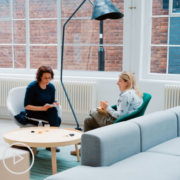CLL Treatment: What Are Your Current Options? from Patient Empowerment Network on Vimeo.
Dr. Javier Pinilla-Ibarz reviews current approaches to treating CLL patients, including targeted therapies and the role of watchful waiting in newly diagnosed patients. Want more information? Download the Program Resource Guide here.
Dr. Javier Pinilla-Ibarz is the Lymphoma Section Head and Director of Immunotherapy in the malignant hematology department at Moffitt Cancer Center. More about this expert here.
See More From The Fact or Fiction? CLL Series
Related Resources
Transcript:
Dr. Javier Pinilla
Well, right now, most of the time – in fact, it’s the most common scenario that we encounter on a weekly basis. Patients get diagnosed with leukemia. That is really a bad word for most of the patients, and they really come to our clinic as a very, very scared and anxious about the diagnosis. However, we don’t really treat most of them. Almost 70% of the patients don’t require therapy to start with, right? So, as you may know – and many, many people who really gonna watch this program will know that we really do active surveillance and watchful waiting.
For many, many months, sometimes years, and there is some specific criteria that patients need to really accomplish to really start therapy. What are those? Well, developing an anemia, low platelets, large lymph nodes that really produce some symptoms, B-cell symptoms like, you know, night sweats, drenching night sweats, fevers, weight loss, lack of appetite, and fatigue, and so on, right?
So, there is no doubt that there is reason why we need to treat. Regarding the treatment of this condition, well, we have been lucky because in the last, let’s say, seven, eight years, there has been a plethora and really large and new advances in the therapy for this condition. We went from the very old chemotherapy strategies in the oral form or even the intravenous form, chlorambucil, a very old drug, more than 50 years in the ways, through fludarabine, Cytoxan, even bendamustine. These last three were used in combination with what we call immunotherapy.
So, chemoimmunotherapy was very, very popular, let’s say, 10 years ago after the chlorambucil went away as a really not very optimal therapy. So, the main standard of therapy for CLL for many years in combination of chemo and immunotherapy with really good results. However, patients unfortunately in many situations will really relapse.
So, we always talk to the patient that when the times of therapy comes, we gonna really put the patient in remission in many cases. In some cases, it’s not really a full remission. It’s a partial remission. But this, most of the time, happen for a certain period of time upon after the patient will require a new therapy. That was kind of the dilemma and the things that we are being really experienced in for years.
However, the introduction of target therapy, that was really a revolution in CLL. That’s happened in many other cancers, including other leukemias, like a chronic myeloid leukemia. These new drugs really came to really change the paradigm, to really fix the duration of chemoimmunotherapy to really taking pills, we can really get a patient in a remission, or at least in a very good control of the disease for a longer period of time as soon as the patient continues to take the drug.
Obviously, we’re talking about BTK inhibitors that really, really extremely popular, and truly, today, a standard of care for any patient who has newly diagnosed CLL who requires therapy in any form, high risk, low risk, older, younger, with comorbid condition, without. This is very well reflected in NCCN guidelines with category 1, in this case, to the most common.
the case I ready to try. So, we know that. We know that, and we really see patients who really enjoy these drugs for a long period of times. However, obviously, this always come with another issues, like intolerance, and in some other cases, progression, right?
So, it’s – BTK mutation has been described and has been seen in high-risk patients. So, this being the standard, and really, we enjoying this, but we have a very recent, last May, a new drug approved. It was already approved for patients who really failed other therapies but now also, we have the ability to get this drug as an initial therapy.
This therapy, in this case, is called a BCL-2 inhibitor. The name is venetoclax, in combination with another immunotherapy I mentioned before that was classically used with chemo. In this case, venetoclax, BCL-2 inhibitor, is combined with obinutuzumab, a drug with a very powerful anti-CD20 monoclonal antibody.
What really has brought us this new strategy? Well, it’s coming back that the paradigm, as mentioned before, changed from fixed duration with chemoimmunotherapy to long term durability for pills, but now, we have also the opportunity to discuss with patients the possibility to really offer them, in certain conditions, not for everyone – again, we need to really understand that we need to customize the therapy for patients, right?
But this new combination really, really will allow us to – many patients who don’t want to stay in therapy for life, so we can really offer back time-limited therapy with substituting the old chemotherapy by this drug called BCL-2 inhibitors, venetoclax. They work very similar to chemotherapy, and they are extremely effective, you know, cleaning or at least reducing, and sometimes completely eradicating most of the CLL cells in the bone marrow of patients with CLL.
However, we still no have longer follow-up in the front line. We have a longer follow up in the second line when patient has failed chemo or other drugs with these combination with venetoclax. In the front line, the data are very, very good, but the – it’s relatively short follow-up. So, patients receive care for a year, and they stop. So now, we are following those patients. There was a recent publication in the New England Journal that really described this population with this trial called CLL 14, but definitely, we need to really continue to see how these data evolve as we have seen with a routine for many years.
We have already seven years follow up on ibrutinib, and it’s something that keep going, and this is what is gonna help us to understand who and what can really be given these kind of therapies, okay?













